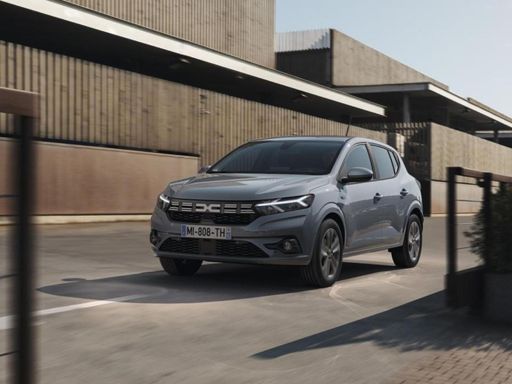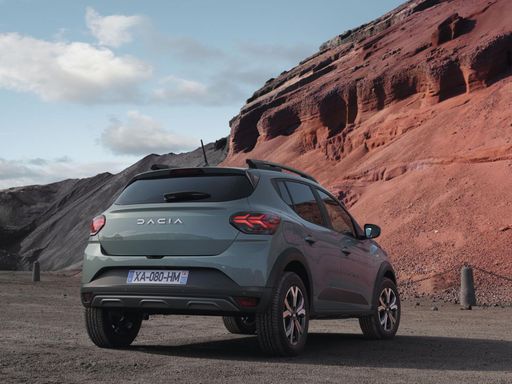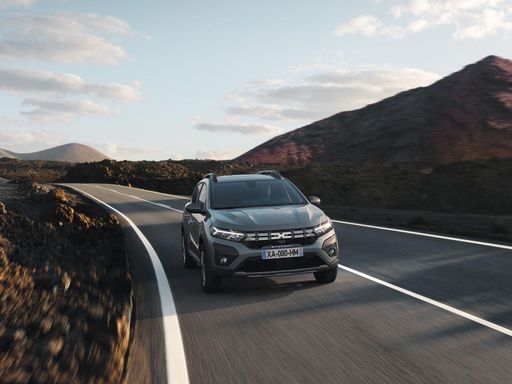Dacia Sandero vs Renault R4 – Differences & prices compared
Two cars, one duel: Dacia Sandero meets Renault R4.
Which one wins in performance, efficiency and value for money? Find out now!
Costs and Efficiency: When it comes to price and running costs, the biggest differences usually appear. This is often where you see which car fits your budget better in the long run.
Dacia Sandero has a significantly advantage in terms of price – it starts at 10700 £, while the Renault R4 costs 25200 £. That’s a price difference of around 14495 £.
Engine and Performance: Power, torque and acceleration say a lot about how a car feels on the road. This is where you see which model delivers more driving dynamics.
When it comes to engine power, the Renault R4 has a clearly perceptible edge – offering 150 HP compared to 110 HP. That’s roughly 40 HP more horsepower.
In acceleration from 0 to 100 km/h, the Renault R4 is noticeable quicker – completing the sprint in 8.20 s, while the Dacia Sandero takes 10 s. That’s about 1.80 s faster.
In terms of top speed, the Dacia Sandero performs to a small extent better – reaching 183 km/h, while the Renault R4 tops out at 150 km/h. The difference is around 33 km/h.
There’s also a difference in torque: Renault R4 pulls slightly stronger with 245 Nm compared to 200 Nm. That’s about 45 Nm difference.
Space and Everyday Use: Beyond pure performance, interior space and usability matter most in daily life. This is where you see which car is more practical and versatile.
Both vehicles offer seating for 5 people.
In curb weight, Dacia Sandero is evident lighter – 1089 kg compared to 1485 kg. The difference is around 396 kg.
In terms of boot space, the Renault R4 offers clearly perceptible more room – 420 L compared to 328 L. That’s a difference of about 92 L.
In maximum load capacity, the Renault R4 performs distinct better – up to 1405 L, which is about 297 L more than the Dacia Sandero.
When it comes to payload, Renault R4 hardly perceptible takes the win – 443 kg compared to 436 kg. That’s a difference of about 7 kg.
Who comes out on top?
Overall, the Dacia Sandero shows itself to be performs better in key areas and secures the title of DriveDuel Champion.
It convinces with the more balanced overall package and proves to be the more versatile choice for everyday use.

Dacia Sandero
Dacia Sandero
The Dacia Sandero stands out as an exceptional value in the hatchback market, offering a blend of practicality and affordability that appeals to a wide range of drivers. Its understated design is complemented by a surprisingly spacious interior, providing ample comfort and functionality for everyday use. With impressive fuel efficiency and a solid reputation for reliability, the Sandero remains a popular choice for those seeking a no-nonsense vehicle without sacrificing essential modern features.
details @ dacia.at
@ dacia.at
 @ dacia.at
@ dacia.at
 @ dacia.at
@ dacia.at
Renault R4
The Renault R4, affectionately known as the "R4," is a quintessential symbol of French automotive simplicity and practicality. This classic compact car, originally introduced in the early 1960s, won over numerous enthusiasts with its versatile design and dependable performance. Its no-frills charm and robust build made it a beloved choice for rural drivers and city dwellers alike, cementing its status as an iconic piece of automotive history.
details

|
|
|
|
|
Costs and Consumption |
|
|---|---|
|
Price
10700 - 16700 £
|
Price
25200 - 31200 £
|
|
Consumption L/100km
5.3 - 7.1 L
|
Consumption L/100km
-
|
|
Consumption kWh/100km
-
|
Consumption kWh/100km
14.2 - 15.1 kWh
|
|
Electric Range
-
|
Electric Range
308 - 409 km
|
|
Battery Capacity
-
|
Battery Capacity
40 - 52 kWh
|
|
co2
105 - 140 g/km
|
co2
0 g/km
|
|
Fuel tank capacity
32 - 50 L
|
Fuel tank capacity
-
|
Dimensions and Body |
|
|---|---|
|
Body Type
Hatchback
|
Body Type
SUV
|
|
Seats
5
|
Seats
5
|
|
Doors
5
|
Doors
5
|
|
Curb weight
1089 - 1209 kg
|
Curb weight
1485 - 1537 kg
|
|
Trunk capacity
328 L
|
Trunk capacity
420 L
|
|
Length
4088 - 4099 mm
|
Length
4144 mm
|
|
Width
1848 mm
|
Width
1808 mm
|
|
Height
1499 - 1535 mm
|
Height
1552 mm
|
|
Max trunk capacity
1108 L
|
Max trunk capacity
1405 L
|
|
Payload
404 - 436 kg
|
Payload
410 - 443 kg
|
Engine and Performance |
|
|---|---|
|
Engine Type
Petrol, LPG
|
Engine Type
Electric
|
|
Transmission
Manuel, Automatic
|
Transmission
Automatic
|
|
Transmission Detail
Manual Gearbox, CVT
|
Transmission Detail
Reduction Gearbox
|
|
Drive Type
Front-Wheel Drive
|
Drive Type
Front-Wheel Drive
|
|
Power HP
67 - 110 HP
|
Power HP
122 - 150 HP
|
|
Acceleration 0-100km/h
10 - 16.7 s
|
Acceleration 0-100km/h
8.2 - 9.2 s
|
|
Max Speed
158 - 183 km/h
|
Max Speed
150 km/h
|
|
Torque
95 - 200 Nm
|
Torque
225 - 245 Nm
|
|
Number of Cylinders
3
|
Number of Cylinders
-
|
|
Power kW
49 - 81 kW
|
Power kW
90 - 110 kW
|
|
Engine capacity
999 cm3
|
Engine capacity
-
|
General |
|
|---|---|
|
Model Year
2024 - 2025
|
Model Year
2025
|
|
CO2 Efficiency Class
D, C, E
|
CO2 Efficiency Class
A
|
|
Brand
Dacia
|
Brand
Renault
|
What drive types are available for the Dacia Sandero?
The Dacia Sandero is available as Front-Wheel Drive.
The prices and data displayed are estimates based on German list prices and may vary by country. This information is not legally binding.
